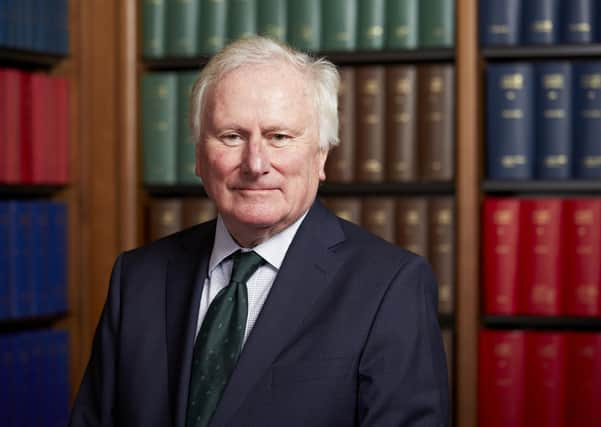Oxford professor: The Supreme Court ruling on Gerry Adams poses a very serious challenge to the ordinary functioning of government


Just over a fortnight ago, the Supreme Court allowed Gerry Adams’s appeal against his convictions in 1975 for escaping from lawful custody, ruling that he had not been lawfully detained at all.
As today’s Mail on Sunday reports, this ruling opens the door for Adams, and for others, to bring proceedings against the government for compensation for false imprisonment.
Advertisement
Hide AdAdvertisement
Hide AdIt also poses a very serious challenge to the ordinary functioning of government.


Adams did not appeal against conviction in 1975. But he was granted leave to appeal out of time in 2017.
The rationale for his appeal was that he had discovered, in 2009, that a legal advisor to the attorney general had expressed doubts at the time of his prosecution about whether his detention was lawful. This should not have been a reason for an appeal out of time.
Nothing in the documents changed the law or facts relevant to the 1975 convictions. Adams could have challenged the lawfulness of his custody during his trial and/or by way of an appeal at the time.
Advertisement
Hide AdAdvertisement
Hide AdHowever, leave to appeal having been granted, it fell to the Court of Appeal of Northern Ireland, and then the Supreme Court, to consider its merits.
Like others detained without trial from November 1972, Adams was subject to an interim custody order (ICO).
The ICO authorised temporary detention, for up to 28 days or until a commissioner, usually a former judge, determined whether he was likely involved in terrorism and whether his continuing detention was necessary to protect the public.
In his appeal, Adams challenged the ICO made in his case.
In November 1972, Her Majesty in Council made the Detention of Terrorist (Northern Ireland) Order. Article 4(1) authorised the secretary of state to make an ICO when it appeared to him that the person in question was involved in terrorism in some way.
Advertisement
Hide AdAdvertisement
Hide AdArticle 4(2) said that an ICO of the secretary of state should be signed by a secretary of state, minister of state or under secretary of state.
The question on appeal was whether the Secretary of State had personally to consider each ICO, or whether his power could be exercised by a minister of state or under secretary of state.
The Court of Appeal rejected the appeal, relying heavily on the Carltona principle. This principle, which takes its name from an important judgment in 1943, provides that when Parliament confers power on a secretary of state, the power may be lawfully exercised by those for whom he has responsibility.
Thus, officials routinely act in the name of the secretary of state, whose personal involvement in each and every decision is not required by our law or constitution.
Advertisement
Hide AdAdvertisement
Hide AdLord Kerr, giving judgment for a unanimous Supreme Court, allowed the appeal, casting doubt on whether there truly is a presumption that Parliament intends the Carltona principle to apply, and reasoning that the structure and language of Article 4 made clear that Parliament intended to require the Secretary of State’s personal involvement in each ICO.
In a new paper published for Policy Exchange’s Judicial Power Project, Sir Stephen Laws and I argue that the Supreme Court’s decision was badly mistaken.
Lord Kerr’s interpretation of the 1972 Order relies on discounting the Carltona principle. But that principle is fundamental to how our government operates. It informs legislating in all contexts and, while the legislator may choose to qualify or disapply the principle, there are established techniques for so doing.
The foundation of Lord Kerr’s judgment is his assertion that it cannot but have been deliberate for Parliament to distinguish making the order (Article 4(1)) from signing the order (Article 4(2)), the point of which was to require the secretary of state’s personal involvement. But this cannot be right.
Advertisement
Hide AdAdvertisement
Hide AdThe obvious point of the structure of Article 4 was to limit and to specify the application of the Carltona principle, not to require the secretary of state to decide every case himself, but to require someone of high standing and responsibility, including a minister of state and under secretary of state, to make the order, which is made by signing the order.
The Supreme Court seems to have misunderstood how government works. Writing in support of our paper, Geoffrey Cox, the former Attorney General, notes that in his experience in government it is not the case that a minister of state would understand himself simply to sign an order, as if his role was passively to bear witness to a decision made by another.
Likewise, Lord Butler of Brockwell, former cabinet secretary, confirms that the significance of the Carltona principle to our system of government and agrees that the Court’s interpretation of the 1972 Order is implausible.
The case against the Supreme Court’s interpretation is very strong. Lord Kerr does not note that the 1972 Order was made by Her Majesty in Council, such that the order’s meaning and effect turns on the government’s legislative intentions, which were made clear in the debates in Parliament about whether to approve the order (it came into force on 7 November 1972 but would have lapsed without parliamentary approval in December that year).
Advertisement
Hide AdAdvertisement
Hide AdIn that debate, the attorney general said clearly that the minister of state may make an ICO; the minister of state for Northern Ireland confirmed that he had himself already exercised this responsibility. The Supreme Court wrongly fails to consider or address this parliamentary material.
So the Supreme Court has ruled that Adams was not lawfully detained.
This is an important propaganda victory for critics of the record of Her Majesty’s Government in endeavouring to maintain peace and order in Northern Ireland.
It opens the door for Adams and others to seek compensation for false imprisonment or breach of the ECHR right to liberty.
Advertisement
Hide AdAdvertisement
Hide AdThe government may have to pay considerable sums to those detained for suspected involvement in terrorism. This is not a good state of affairs.
The government should act swiftly, proposing legislation to make clear that ICOs made by a minister of state or under secretary of state were lawful.
This would reverse the effect of the Supreme Court’s judgment, but would not remove from Adams any order that he won from the court itself.
Ideally, the government would announce an intention to legislate before Adams begins further legal proceedings.
Advertisement
Hide AdAdvertisement
Hide AdOtherwise, that legislation will be misrepresented as an improper interference with ongoing legal proceedings. Parliamentarians should press the government to act.
Lord Butler is pursuing the matter in the Lords, and one hopes he will be joined by others who are concerned about Mr Adams’s victory.
The prospect of having to pay Adams and others is not a happy one. But more worrying still are the judgment’s implications for how (or whether) government works.
By putting in doubt the Carltona principle’s centrality to legislating, the Supreme Court has invited litigation to challenge a range of government actions. This will inevitably lead to caution on the part of Whitehall and to frustration of effective government.
Advertisement
Hide AdAdvertisement
Hide AdUnless the Supreme Court can correct its error in the very near future, which seems improbable, there must be urgent legislation to enable government to work.
• Richard Ekins is head of Policy Exchange’s Judicial Power Project and Professor of Law and Constitutional Government, University of Oxford. His 20,000 word paper on the Supreme Court ruling was co written with Sir Stephen Laws, who was permanent secretary in the Cabinet Office responsible for the Office of the Parliamentary Counsel. The foreword to the paper was written by the former attorney general, Rt Hon. Geoffrey Cox QC MP, and the introduction by the former head of the civil service, Rt Hon. the Lord Butler of Brockwell. Prof Ekins’ summary of the paper, above, was first published on conservativehome.com
• Other reactions to the Supreme Court ruling below
• Trevor Ringland: Supreme Court ruling on Adams walked on graves of judges murdered by IRA
Advertisement
Hide AdAdvertisement
Hide Ad• Jeffrey Dudgeon: Supreme Court ruling on Adams didn’t reflect violent context of the time
• Brian John Spencer: If we are to stop the rewriting of history, we need to say what IRA did during internment
Advertisement
Hide AdAdvertisement
Hide Ad• Kenny Donaldson: Victims of terror are dismayed by the Supreme Court ruling
A message from the Editor:
Thank you for reading this story on our website. While I have your attention, I also have an important request to make of you.
With the coronavirus lockdown having a major impact on many of our advertisers - and consequently the revenue we receive - we are more reliant than ever on you taking out a digital subscription.
Advertisement
Hide AdAdvertisement
Hide AdSubscribe to newsletter.co.uk and enjoy unlimited access to the best Northern Ireland and UK news and information online and on our app. With a digital subscription, you can read more than 5 articles, see fewer ads, enjoy faster load times, and get access to exclusive newsletters and content. Visit https://www.newsletter.co.uk/subscriptions now to sign up.
Our journalism costs money and we rely on advertising, print and digital revenues to help to support them. By supporting us, we are able to support you in providing trusted, fact-checked content for this website.
Alistair Bushe
Editor